List of socialist states
Several past and present states have declared themselves socialist states or in the process of building socialism. The majority of self-declared socialist countries have been Marxist–Leninist or inspired by it, following the model of the Soviet Union or some form of people's or national democracy. They share a common definition of socialism and they refer to themselves as socialist states on the road to communism with a leading vanguard party structure, hence they are often called communist states. Meanwhile, the countries in the non-Marxist–Leninist category represent a wide variety of different interpretations of the term socialism and in many cases the countries do not define what they mean by it. Modern uses of the term socialism are wide in meaning and interpretation.
As a sovereign state is one different entity from the political party that rules that state at any given time, a country may be ruled by a socialist party without the country itself claiming to be socialist or the socialist party being written into the constitution. This has occurred in both one-party and multi-party political systems. In particular, there are numerous cases of social democratic and democratic socialist parties winning elections in liberal democratic states and ruling for a number of terms until a different party wins the elections. While socialist parties have won many elections around the world and most elections in the Nordic countries, many of those countries have not adopted socialism as a state ideology or written the party into the constitution.
Several countries with liberal democratic constitutions mention socialism. India is a liberal democracy that has been ruled by non-socialist parties on many occasions, but its constitution makes references to socialism. Certain other countries such as Croatia,[1] Hungary,[2] Myanmar[3] and Poland[4] have constitutions that make references to their communist and socialist past by recognizing or condemning it, but without claiming to be socialist in the present.
Overview
Self-identification is the only criterion used by the list, therefore it includes all countries that have claimed to be socialist, even if their claims are disputed. All countries that have not claimed to be socialist are excluded, even in cases where certain outside observers regarded those countries as socialist.
The list includes countries that assert in their constitutions that they are based on socialism, regardless of their economic or political system. It does not list countries that do not have constitutional references to socialism as socialist states, even in cases where the government is currently run by a socialist party or other left-wing (centre-left and far-left) parties. Inversely, countries that do maintain constitutional references to socialism are listed, even when those countries are ruled by non-socialist parties. The list is best understood as a list of countries that explicitly claim to be socialist and it does not reflect the actual economic systems themselves.
The following images are a combined map of all countries that declared themselves socialist states under any definition at some point in their history, including recognition by the Soviet Union, color-coded for the number of years they said they were socialist:
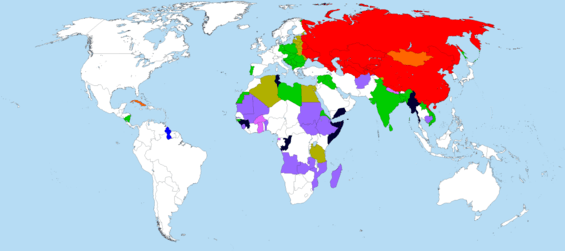
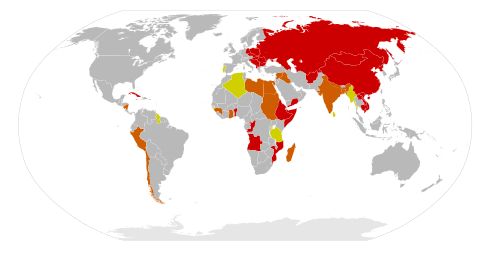
Current socialist states
Marxist–Leninist states
| Country | Since | Duration | Form of government | Party | Head of party | Head of state | Head of government |
|---|---|---|---|---|---|---|---|
| 1 October 1949 | 70 years, 271 days | Unitary one-party socialist republic |
Communist Party of China | Xi Jinping (since 2012) |
Li Keqiang (since 2012) | ||
| 1 January 1959 | 61 years, 179 days | Unitary one-party socialist republic |
Communist Party of Cuba | Raúl Castro (since 2011) |
Miguel Díaz-Canel (since 2018) |
Manuel Marrero Cruz (since 2019) | |
| 2 December 1975 | 44 years, 209 days | Unitary one-party socialist republic |
Lao People's Revolutionary Party | Bounnhang Vorachith (since 2016) |
Thongloun Sisoulith (since 2016) | ||
| 2 July 1976 | 43 years, 362 days | Unitary one-party socialist republic |
Communist Party of Vietnam | Nguyễn Phú Trọng (since 2011) |
Nguyễn Phú Trọng (since 2018) |
Nguyễn Xuân Phúc (since 2016) | |
Non-Marxist–Leninist states
Countries with constitutional references to socialism
| Country | Since | Duration | Form of government | Constitutional statement |
|---|---|---|---|---|
| 3 July 1962 | 57 years, 361 days | Multi-party semi-presidential republic | Preamble (1963): "Faithful to the program adopted by the National Council of the Algerian Revolution in Tripoli, the democratic and popular Algerian Republic will direct its activities toward the construction of the country in accordance with the principles of socialism [...]".[5] Preamble (1996/2016): "Gathered in the national movement and later within the National Front of Liberation, the Algerian people have made great sacrifices in order to assume their collective destiny in the framework of recovered freedom and cultural identity and to build authentic people's democratic constitutional institutions. The National Front of Liberation crowned the sacrifices of the best sons of Algeria during the people's war of liberation with independence and built a modern and full sovereign State".[6] The National Front of Liberation is a political party based on Arab socialism.[7] | |
| 11 April 1971 | 49 years, 78 days | Multi-party parliamentary republic | Preamble: "Further pledging that it shall be a fundamental aim of the State to realise through the democratic process, a socialist society free from exploitation, a society in which the rule of law, fundamental human rights and freedoms, equality and justice, political, economic and social, will be secured for all citizens".[8] | |
| 24 May 1991 | 29 years, 35 days | One-party presidential republic | Since 1991, the People's Front for Democracy and Justice, based on socialism and left-wing nationalism, has been the sole legal political party in Eritrea.[9] | |
| 6 October 1980 | 39 years, 266 days | Multi-party presidential republic | Section 1, Article 1: "Guyana is an indivisible, secular, democratic sovereign state in the course of transition from capitalism to socialism and shall be known as the Co-operative Republic of Guyana".[10] | |
| 19 February 1992 | 28 years, 130 days | One-party socialist republic | Preamble: "The Democratic People's Republic of Korea is the socialist motherland of Juche, which has applied the ideas and leadership of Kim Il-sung".[11] Formerly a Marxist–Leninist state.[nb 3] | |
| 18 December 1976 | 43 years, 193 days | Multi-party parliamentary republic | Preamble: "We, the people of India, having solemnly resolved to constitute India into a Sovereign Socialist Secular Democratic Republic and to secure to all its citizens".[13][14] | |
| 20 September 2015 | 4 years, 282 days | Multi-party parliamentary republic | Section 1, Article 4: "Nepal is an independent, indivisible, sovereign, secular, inclusive democratic, socialism-oriented federal democratic republican state".[15] | |
| 18 July 1979 | 40 years, 346 days | Dominant-party presidential republic | Section 1, Article 5: "Liberty, justice, respect for the dignity of the human person, political and social pluralism, the recognition of the distinct identity of the indigenous peoples and those of African descent within the framework of a unitary and indivisible state, the recognition of different forms of property, free international cooperation and respect for the free self-determination of peoples, Christian values, socialist ideals, and practices based on solidarity, and the values and ideals of the Nicaraguan culture and identity, are the principles of the Nicaraguan nation. [...] The socialist ideals promote the common good over individual egoism, seeking to create an ever more inclusive, just and fair society, promoting an economic democracy which redistributes national wealth and eliminates exploitation among human beings".[16] | |
| 2 April 1976 | 44 years, 87 days | Multi-party semi-presidential republic | Preamble: "The Constituent Assembly affirms the Portuguese people's decision to [...] open up a path towards a socialist society".[17] | |
| 26 February 1976 | 44 years, 123 days | One-party semi-presidential republic | Section 2 Chapter 1 Article 33: "Until the complete recovery of national sovereignty, the Frente POLISARIO (Polisario Front) shall be the political framework that shall unite and mobilise politically the Sahrawis to express their aspirations and legitimate rights to self-determination and independence and to defend their national unity and complete the building of their independent Sahrawi State".[18] The Polisario Front is a political party based on democratic socialism. | |
| 7 September 1978 | 41 years, 295 days | Multi-party semi-presidential republic | Preamble: "[...] to constitute Sri Lanka into a democratic socialist republic whilst ratifying the immutable republican principles of representative democracy, and assuring to all peoples freedom, equality, justice, fundamental human rights and the independence of the judiciary".[19] | |
| 26 April 1964 | 56 years, 63 days | Dominant-party semi-presidential republic | Section 1, Article 3: "The United Republic is a democratic, secular and socialist state which adheres to multi-party democracy".[20] |
Socialist territories with limited recognition
These are territories that have claimed independence or autonomy and have declared themselves socialist under some interpretation of the term. While these territories have created stable institutions of governance that have existed for a considerable period of the time, they are not widely recognized as states by the international community and officially belong to other sovereign states under international law.


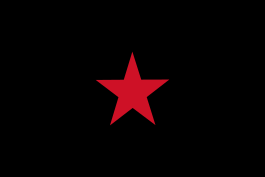

Former socialist states
Marxist–Leninist states
| Country | Full name | From | Until | Duration | Ruling party | Constitutional statement |
|---|---|---|---|---|---|---|
| Democratic Republic of Afghanistan | 27 April 1978 | 30 November 1987 | 9 years, 217 days | People's Democratic Party of Afghanistan | Preamble: "In the present stage, the People's Democratic Party of Afghanistan, as the initiator and coordinator of the policy of National Reconciliation, actively carries forward together with other political, national and democratic forces".[25]
The People's Democratic Party of Afghanistan was a Marxist–Leninist party.[26] | |
| Republic of Afghanistan | 30 November 1987 | 28 April 1992 | 4 years, 150 days | |||
| Total | 27 April 1978 | 28 April 1992 | 14 years, 1 day | |||
| Democratic Government of Albania | 29 November 1944 | 11 January 1946 | 1 year, 43 days | Party of Labour of Albania[nb 5] | Section 1, Article 1: "The People's Socialist Republic of Albania is a state of the dictatorship of the proletariat, which expresses and defends the interests of all the working people".[27] | |
| People's Republic of Albania | 11 January 1946 | 28 December 1976 | 30 years, 352 days | |||
| People's Socialist Republic of Albania | 28 December 1976 | 22 March 1992 | 15 years, 85 days | |||
| Total | 29 November 1944 | 22 March 1992 | 47 years, 114 days | |||
| People's Republic of Angola | 11 November 1975 | 27 August 1992 | 16 years, 290 days | Popular Movement for the Liberation of Angola | Section 1, Article 2: "All sovereignty is vested in the Angolan people. The MPLA, their legitimate representative constituted from a broad front including all patriotic forces engaged in the anti-imperialist struggle, is responsible for the political, economic, and social leadership of the nation".[28] | |
| Byelorussian Soviet Socialist Republic[nb 6] | 31 July 1920 | 25 August 1991 | 70 years, 344 days | Communist Party of Byelorussia | Section 1, Article 1: "The Byelorussian Soviet Socialist Republic is a socialist state expressing the will and interests of the workers, peasants and intelligentsia, the working people of all nationalities of the republic".[29] | |
| People's Republic of Benin | 30 November 1975 | 1 March 1990 | 14 years, 91 days | People's Revolutionary Party of Benin | The Marxist–Leninist People's Revolutionary Party of Benin became the sole legal political party on 30 November 1975.[30] | |
| People's Republic of Bulgaria | 15 September 1946 | 7 December 1990 | 44 years, 83 days | Bulgarian Communist Party | Section 1, Article 1: "The People's Republic of Bulgaria is a socialist state of the working people from town and village, headed by the working class".[31] | |
| Democratic Kampuchea | 17 April 1975 | 22 June 1982 | 7 years, 66 days | Communist Party of Kampuchea | Constitutionally a Marxist–Leninist state from 1975 to 1991, Cambodia was not internationally recognized by some countries following the Cambodian–Vietnamese War.[32][33] | |
| People's Republic of Kampuchea | 10 January 1979 | 1 May 1989 | 10 years, 111 days | People's Revolutionary Party of Kampuchea | ||
| State of Cambodia | 1 May 1989 | 23 October 1991 | 2 years, 175 days | |||
| Total | 17 April 1975 | 23 October 1991 | 16 years, 189 days | |||
| People's Republic of the Congo | 3 January 1970 | 15 March 1992 | 22 years, 72 days | Congolese Labor Party | Presidential oath: "I swear allegiance to the Congolese people, to the Revolution and to the Congolese Labor Party. I shall undertake, while guided by Marxist-Leninist principles, [...] to devote all my strength to the triumph of the proletarian ideals".[34] | |
| Czechoslovak Republic | 9 June 1948 | 11 July 1960 | 12 years, 32 days | Communist Party of Czechoslovakia | Section 1, Article 1: "The Czechoslovak Socialist Republic is a socialist state founded on the firm alliance of the workers, farmers and intelligentsia, with the working class as its head".[35] From 1669 to 1990, Czechoslovakia consisted of two constituent republics. | |
| Czechoslovak Socialist Republic | 11 July 1960 | 29 March 1990 | 29 years, 261 days | |||
| Total | 9 June 1948 | 29 March 1990 | 41 years, 293 days | |||
| Provisional Military Government of Socialist Ethiopia | 28 June 1974 | 22 February 1987 | 12 years, 239 days | Commission for Organizing the Party of the Working People of Ethiopia[nb 7] | Country declared Marxist–Leninist in 1974, with the Workers' Party of Ethiopia becoming "the formulator of the country's development process and the leading force of the state and in society" in 1987.[36] | |
| Workers' Party of Ethiopia[nb 8] | ||||||
| People's Democratic Republic of Ethiopia | 22 February 1987 | 27 May 1991 | 4 years, 94 days | |||
| Total | 28 June 1974 | 27 May 1991 | 16 years, 333 days | |||
| German Democratic Republic | 7 October 1949 | 3 October 1990 | 40 years, 361 days | Socialist Unity Party of Germany | Section 1, Article 1: "The German Democratic Republic is a socialist state of workers and peasants. It is the political organization of the working people of town and country under the leadership of the working class and its Marxist-Leninist party".[37] | |
| People's Revolutionary Government | 13 March 1979 | 25 October 1983 | 4 years, 226 days | New Jewel Movement | People's Law Number Two: "The People's Revolutionary Government, PRG, is hereby established as of Tuesday 13 March 1979, in accordance with the sovereign will of the Grenadian people, and in it shall be vested of executive and legislative power".[38] The New Jewel Movement considered themselves a Marxist–Leninist vanguard party.[39] | |
| Hungarian People's Republic | 20 August 1949 | 23 October 1989 | 40 years, 64 days | Hungarian Working People's Party[nb 9] | Section 1, Article 2: "The Hungarian People's Republic is a socialist state".[40] | |
| Hungarian Socialist Workers' Party[nb 10] | ||||||
| Democratic People's Republic of Korea | 9 September 1948 | 19 February 1992 | 43 years, 163 days | Workers' Party of Korea | Section 1, Article 1: "The Democratic People's Republic of Korea is an independent socialist state representing the interests of all the Korean people".[41] Currently a non-Marxist–Leninist socialist state.[nb 11] | |
| Mongolian People's Republic | 24 November 1924 | 12 February 1992 | 67 years, 80 days | Mongolian People's Revolutionary Party | Section 1, Article 2: "The Mongolian People's Republic is a state which exists and is developing in the form of people's democracy".[44] | |
| People's Republic of Mozambique | 25 June 1975 | 1 December 1990 | 15 years, 159 days | FRELIMO | Section 1, Article 2: "Power belongs to the workers and peasants united and led by FRELIMO and organs of people's power".[45] | |
| Republic of Poland | 28 June 1945 | 22 July 1952 | 7 years, 24 days | Polish Workers' Party[nb 12] | Section 1, Article 1: "The Polish People's Republic is a socialist state".[46] | |
| Polish United Worker's Party[nb 13] | ||||||
| Polish People's Republic | 22 July 1952 | 30 December 1989 | 37 years, 161 days | |||
| Total | 28 June 1945 | 30 December 1989 | 44 years, 185 days | |||
| Romanian People's Republic | 30 December 1947 | 21 August 1965 | 17 years, 234 days | Romanian Workers' Party | Section 1, Article 3: "The leading force of society in the Socialist Republic of Romania is the Romanian Communist Party".[47] | |
| Socialist Republic of Romania | 21 August 1965 | 30 December 1989 | 24 years, 131 days | Romanian Communist Party | ||
| Total | 30 December 1947 | 30 December 1989 | 42 years, 0 days | |||
| Somali Democratic Republic | 21 October 1969 | 26 January 1991 | 21 years, 97 days | Somali Revolutionary Socialist Party | Section 1, Article 1: "The Somali Democratic Republic is a socialist state led by the working class and is an integral part of the Arab and African entities".[48] | |
| Tannu Tuvan People's Republic | 14 August 1921 | 24 November 1926 | 5 years, 102 days | Tuvan People's Revolutionary Party | Chapter 1: "[...] in international affairs, the state acts under the auspices of Soviet Russia".[49] In October 1944, the country was annexed by the Soviet Union at the request of Tuva's parliament.[49] | |
| Tuvan People's Republic | 24 November 1926 | 11 October 1944 | 17 years, 322 days | |||
| Total | 14 August 1921 | 11 October 1944 | 23 years, 58 days | |||
| Russian Soviet Federative Socialist Republic | 9 November 1917 | 30 December 1922 | 5 years, 51 days | Communist Party of the Soviet Union[nb 14] | Section 1, Article 1, Chapter 2: "Bearing in mind as its fundamental problem the abolition of the exploitation of men by men, the entire abolition of the division of the people into classes, the suppression of exploiters, the establishment of a socialist society, and the victory of socialism in all lands".[50][51] Section 1, Article 1: "The Union of Soviet Socialist Republics is a socialist state of the whole people, expressing the will and interests of the workers, peasants and intelligentsia, the working people of all the nations and nationalities of the country".[52] The Soviet Union consisted of fifteen republics.[nb 15][53] | |
| Union of Soviet Socialist Republics | 30 December 1922 | 6 March 1990 [nb 16] | 67 years, 66 days | |||
| Total | 9 November 1917 | 6 March 1990 | 72 years, 117 days | |||
| Ukrainian Soviet Socialist Republic[nb 17] | 10 March 1919 | 24 August 1991 | 72 years, 167 days | Communist Party of Ukraine | Section 1, Article 1: "The Ukrainian Soviet Socialist Republic is the whole peoples state that expresses the will and interests of the workers, peasants and intellectuals, workers of the republic of all nationalities".[54] | |
| Democratic Republic of Vietnam | 31 December 1959 | 2 July 1976 | 16 years, 184 days | Communist Party of Vietnam | Section 2, Article 9: "The Democratic Republic of Vietnam is advancing step by step from people's democracy to socialism by developing and transforming the national economy along socialist lines, transforming its backward economy into a socialist economy with modern industry and agriculture and an advanced science and technology".[55] | |
| People's Republic of South Yemen | 30 November 1967 | 1 December 1970 | 3 years, 1 day | National Liberation Front[nb 18] | Section 1, Article 3: "The Yemeni Socialist Party, armed with the Scientific Socialism theory, is the leader and guide of society and state".[56] | |
| People's Democratic Republic of Yemen | 1 December 1970 | 22 May 1990 | 19 years, 172 days | Yemeni Socialist Party[nb 19] | ||
| Total | 30 November 1967 | 22 May 1990 | 22 years, 173 days | |||
| Democratic Federal Yugoslavia | 29 November 1943 | 29 November 1945 | 2 years, 0 days | League of Communists of Yugoslavia[nb 20] | Section 1, Article 2: "The socialist system in Yugoslavia is based on relations between people acting as free and equal producers and creators, whose work serves exclusively to satisfy their personal and common needs".[57] Yugoslavia consisted of six constituent socialist republics.[58] | |
| Federal People's Republic of Yugoslavia | 29 November 1945 | 7 April 1963 | 17 years, 129 days | |||
| Socialist Federal Republic of Yugoslavia | 7 April 1963 | 27 April 1992 | 29 years, 20 days | |||
| Total | 29 November 1943 | 27 April 1992 | 48 years, 150 days |
Non-Marxist–Leninist states
| Country | Full name | From | Until | Duration | Constitutional statement |
|---|---|---|---|---|---|
| Union of Burma | 2 March 1962 | 3 January 1974 | 11 years, 307 days | Chapter XVI General Provisions: "In order to overcome this deterioration and to build Socialism, the Revolutionary Council of the Union of Burma assumed responsibility as a historical mission, adopted the Burmese Way to Socialism and also formed the Burma Socialist Programme Party".[59] | |
| Socialist Republic of the Union of Burma | 3 January 1974 | 18 September 1988 | 14 years, 259 days | ||
| Total | 2 March 1962 | 18 September 1988 | 26 years, 200 days | ||
| Republic of Cape Verde | 5 July 1975 | 22 September 1992 | 17 years, 79 days | Chapter 1, Article 1: "Cape Verde is a sovereign, democratic, laic, unitary, anti-colonialist and anti-imperialist state".[60] It was a one-party state ruled by the African Party for the Independence of Cape Verde, whose goal was the construction of a socialist society and which received support from other socialist states.[61] | |
| Republic of Djibouti | 24 October 1981 | 3 October 1992 | 10 years, 345 days | Law on National Mobilization: Part 2, Article 4: "During the National Mobilization the People's Rally for Progress guarantees the formation and expression of popular consensus and the national will for economic and social transformation. It brings to the President of the Republic, guarantor of national unity, the support of its organization and the action of its activists. It ensures within it the democratic debate between the various social, cultural, economic and regional components of the national community as well as their equitable representation, their free expression and right of proposal. Its statutes must promote a broad development of internal democracy as well as broad popular support for the various institutions of the Republic".[62] The People's Rally for Progress is a socialist party. | |
| Republic of Egypt | 18 June 1953 | 22 February 1958 | 4 years, 249 days | Preamble: "The Arab Republic of Egypt is a democratic, socialist state based on the alliance of the working forces of the people".[63] | |
| United Arab Republic | 22 February 1958 | 28 September 1961 | 3 years, 218 days | ||
| Arab Republic of Egypt | 28 September 1961 | 26 March 2007 | 45 years, 179 days | ||
| Total | 18 June 1953 | 26 March 2007 | 53 years, 281 days | ||
| Republic of Equatorial Guinea | 7 July 1970 | 3 August 1979 | 9 years, 27 days | See the 1973 Equatorial Guinean constitutional referendum. Preamble: "The United National Workers' Party of Equatorial Guinea (PUNT), draws up the general policy of the nation, and coordinates and controls it through the State organs".[64] The United National Workers' Party was a political party based on African socialism. | |
| Republic of Ghana | 1 July 1960 | 24 February 1966 | 5 years, 238 days | Part 1, Article 2: "In the confident expectation of an early surrender of sovereignty to a union of African states and territories, the people now confer on Parliament the power to provide for the surrender of the whole or any part of the sovereignty of Ghana".[65] See the 1960 Ghanaian constitutional referendum.[66] Kwame Nkrumah, the first President of Ghana, is mentioned in the 1960 constitution. Nkrumah and his party, the Convention People's Party, were African socialists, whose party constitution stated: "To establish a socialist state in which all men and women shall have equal opportunity and where there shall be no capital[ist] exploitation".[67] Ghana's Seven Year Development plan included the task to "[e]mbark upon the socialist transformation of the economy through the rapid development of state and co-operative sectors".[68] | |
| Republic of Guinea | 2 October 1958 | 3 April 1984 | 25 years, 184 days | From 1958–1984, the African socialist Democratic Party of Guinea – African Democratic Rally was the sole legal political party in Guinea.[69] | |
| Iraqi Republic | 14 July 1958 | 8 February 1963 | 4 years, 209 days | From 1958–1963, the Iraqi Communist Party was the sole legal political party in Iraq. See the 14 July Revolution.[70] | |
| 8 February 1963 | 17 July 1968 | 5 years, 160 days | From 1963–1968, the Arab Socialist Union was the sole legal political party in Iraq.[71] | ||
| Iraqi Republic | 17 July 1968 | 7 April 2005 | 36 years, 264 days | Chapter 1, Article 1: "Its [the country's] basic objective is the realization of one Arab State and the build-up of the socialist system".[72] | |
| Total | 14 July 1958 | 7 April 2005 | 46 years, 267 days | ||
| Libyan Arab Republic | 1 September 1969 | 2 March 1977 | 7 years, 182 days | Section 1, Article 6: "The aim of the state is the realization of socialism through the application of social justice which forbids any form of exploitation".[73] | |
| Socialist People's Libyan Arab Jamahiriya | 2 March 1977 | 15 April 1986 | 9 years, 44 days | ||
| Great Socialist People's Libyan Arab Jamahiriya | 15 April 1986 | 23 October 2011 | 25 years, 191 days | ||
| Total | 1 September 1969 | 23 October 2011 | 42 years, 52 days | ||
| Democratic Republic of Madagascar | 30 December 1975 | 12 September 1992 | 16 years, 257 days | See the 1975 Malagasy constitutional referendum.[74] | |
| Republic of Mali | 2 June 1974 | 26 March 1991 | 16 years, 269 days | The 1974 Malian constitution provided for a one-party system which was ruled by the socialist Democratic Union of the Malian People.[75] | |
| Islamic Republic of Mauritania | 25 December 1961 | 10 July 1978 | 16 years, 197 days | Chapter 1, Article 9: "The popular will is expressed through the democratically organized State Party. The Mauritanian People's Party, born from the merger of the national parties existing on December 25, 1961, is recognized as the only party of the State".[76] The Mauritanian People's Party was a political party based on Islamic socialism. | |
| Republic of Seychelles | 5 June 1977 | 27 December 1991 | 14 years, 205 days | Preamble: "Seychelles is declared to be a sovereign socialist republic".[77] | |
| Republic of Sierra Leone | 12 July 1978 | 1 October 1991 | 13 years, 81 days | Chapter X, Article 176: "The All People's Congress established and in being immediately prior to the commencement of this Constitution shall continue in being thereafter and be deemed to be the One Party officially recognised in Sierra Leone".[78] The All People's Congress is a political party based on African socialism. | |
| Democratic Republic of the Sudan | 25 May 1969 | 10 October 1985 | 16 years, 138 days | Preamble: "In the belief of our pursuit of freedom, socialism and democracy to achieve the society of sufficiency, justice and equality".[79] | |
| Syrian Arab Republic | 8 March 1963 | 27 February 2012 | 48 years, 356 days | Section 1, Article 8: "The leading party in the society and the state is the Socialist Arab Ba'ath Party. It leads a patriotic and progressive front seeking to unify the resources of the people's masses and place them at the service of the Arab nation's goals".[80] | |
| Republic of Tunisia | 22 October 1964 | 27 February 1988 | 23 years, 128 days | From 1964–1988, the Socialist Destourian Party was the sole legal political party in Tunisia.[81] | |
| Republic of Zambia | 25 August 1973 | 24 August 1991 | 17 years, 364 days | Section 1, Article 4: "There shall be one and only one political party or organization in Zambia, namely, the United National Independence Party [...]".[82] The United National Independence Party is a political party based on African socialism. |
Ephemeral socialist states
These are short-lived political entities that emerged during wars or revolutions and declared themselves socialist under some interpretation of the term, but which did not survive long enough to create a stable government or achieve international recognition.

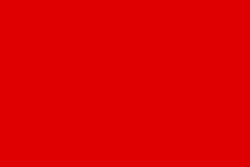


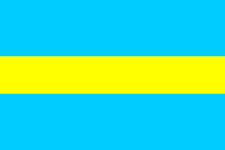

.svg.png)



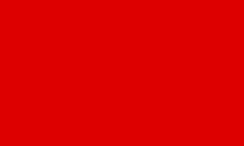

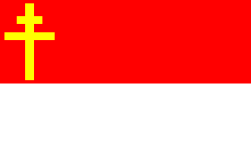






.svg.png)
.svg.png)











.svg.png)


.svg.png)
.svg.png)
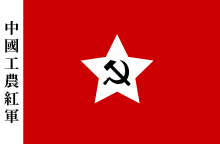

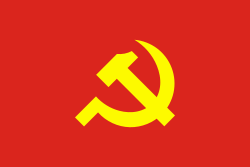
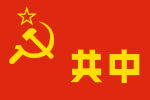
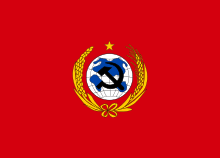

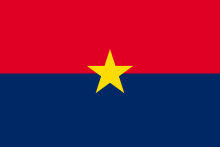
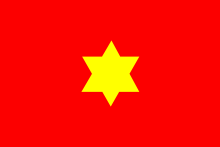






.svg.png)
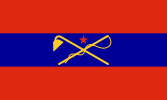
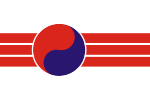
.svg.png)
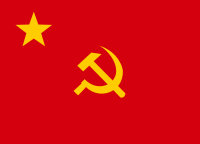

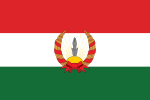
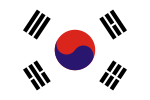

.svg.png)


.svg.png)

.svg.png)
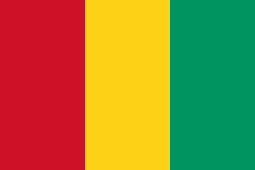

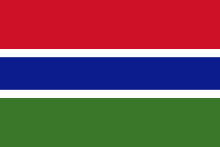
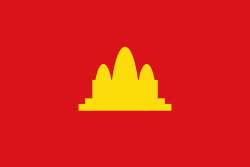
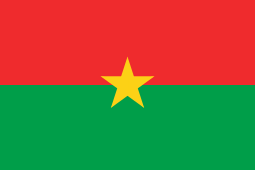

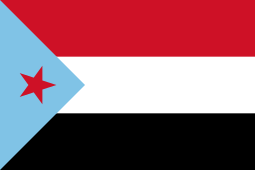

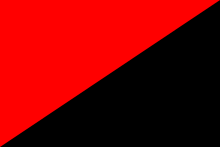

Multi-party or non-socialist states with governing communist or socialist parties
There are multi-party states with communist or socialist parties leading the government, sometimes together. Such states are not considered to be communist or socialist states because the countries themselves allow for multiple parties and do not provide a constitutional role for their communist parties or socialism. This list does not include socialist parties following social democracy which governed most of the Western world as part of the mainstream centre-left. It mainly includes democratic socialist parties positioned to their left.
Examples of direct communist party rule in multi-party democracies and constitutionally socialist states (Guyana and Nicaragua) include:
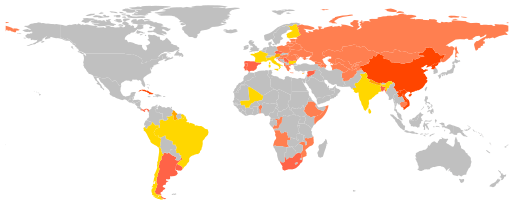 |
| Officially ruling parties in communist states Communist parties as ruling parties or part of a governing coalition in multi-party states Formerly ruling in a one-party system Formerly ruling in a parliamentary majority or minority government Formerly ruling as a coalition partner or supporter |
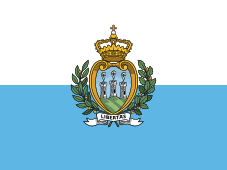
.svg.png)
.svg.png)


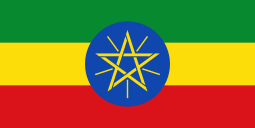
%3B_Flag_of_Serbia_and_Montenegro_(2003%E2%80%932006).svg.png)
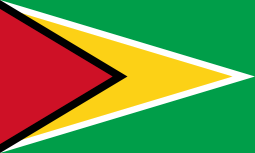

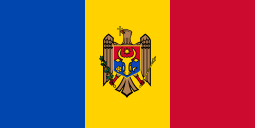

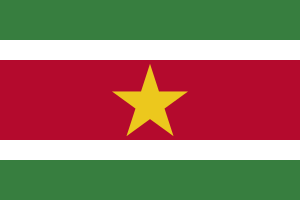
These ruling communist parties have won elections and governed in the context of multi-party liberal democracies without seeking to establish a one-party state and therefore the listed entities do not fall under the typical definition of a socialist or communist state.
Notes
- The sovereignty of the People's Republic of China is disputed by the Republic of China. For more information, see Cross-Strait relations. Hong Kong and Macau are administrated by the People's Republic of China under the "One country, two systems" principle. For an overview of the principle, see "One Country, Two Systems".
- The sovereignty of the Democratic People's Republic of Korea is disputed by the Republic of Korea. For more information, see North Korea–South Korea relations.
- Although the government's official state ideology now incorporates the Juche element of Kim Il-sung's Kimilsungism–Kimjongilism policy as opposed to orthodox Marxism–Leninism, North Korea still considers itself a socialist state.[12]
- The sovereignty of the Sahrawi Arab Democratic Republic is disputed by the Kingdom of Morocco. For more information, see the International recognition of the Sahrawi Arab Democratic Republic.
- Known as the Albanian Communist Party until 1948.
- Part of the Soviet Union but admitted into the United Nations as a separate entity.
- Until September 12, 1984.
- From 12 September 1984.
- Until 31 October 1956.
- From 1 November 1956.
- In 1992, all references to Marxism–Leninism in the constitution were dropped and replaced with Juche.[42] In 2009, the constitution was quietly amended so that not only did it remove all Marxist–Leninist references present in the first draft, but it also dropped all reference to communism.[43]
- Until 21 December 1948.
- From 21 December 1948.
- Known as the Russian Social Democratic Labor Party (Bolsheviks) until March 1918, the Russian Communist Party (Bolsheviks) until December 1925 and the All-Union Communist Party (Bolsheviks) until October 1952.
- The annexation of the Baltic republics in 1940 is considered an illegal occupation by the current Baltic governments and by a number of Western countries, including the United States and the European Union, who assert that the states were independent countries occupied by the Soviet Union. According to Article 76 of the Constitution of the Soviet Union, the Baltic republics were officially sovereign entities in a federation. However, the Soviet Union was heavily centralized and was de facto a single federal state.
- The Communist Party of the Soviet Union ceased ruling the country on 6 March 1990 when the Congress of People’s Deputies amended Article 6 of the Soviet Constitution. The Soviet Union itself was dissolved on 26 December 1991.
- Part of the Soviet Union, it was admitted into the United Nations as a separate entity.
- Until 1978.
- From 1978.
- Known as the Communist Party of Yugoslavia until 1952.
- Constitutionally a socialist state.
- Formerly a Marxist–Leninist state.
- Formerly a socialist state.
- Constitutionally a socialist state during this period.
- Formerly a Marxist–Leninist state as part of the Soviet Union.
References
- Tschentscher, Axel. "Croatia Constitution". Servat.unibe.ch. Retrieved 27 December 2019.
- Tschentscher, Axel. "Hungary Index". Servat.unibe.ch. Retrieved 27 December 2019.
- "Myanmar 2008". Constitute Project. Retrieved 27 December 2019.
- Tschentscher, Axel. "Poland - Constitution". Servat.unibe.ch. Retrieved 27 December 2019.
- Article Preamble, Section Preamble of the Constitution of the People's Democratic Republic of Algeria (20 September 1963)
- Article Preamble, Section Preamble of the Constitution of the People's Democratic Republic of Algeria (28 November 1996)
- Evans, M. (2007). Algeria: Anger of the Dispossessed. London: Yale University Press. p. 34.
- Article Preamble, Section Preamble of the Constitution of the People's Republic of Bangladesh (4 November 1972)
- "2007 Country Reports on Human Rights Practices - Eritrea". Refworld. The UN Refugee Agency. March 11, 2008. Retrieved June 24, 2020.
The People's Front for Democracy and Justice (PFDJ), previously known as the Eritrean People's Liberation Front, is the sole political party and has controlled the country since 1991.
- Article 1, Section The State and the Constitution of the Constitution of the Cooperative Republic of Guyana (20 February 1980)
- Article Preamble, Section Preamble of the Constitution of the Democratic People's Republic of Korea (9 September 1948)
- Article Preamble, Section Preamble of the Socialist Constitution of the Democratic People's Republic of Korea (27 December 1972). "The Democratic People's Republic of Korea is the socialist motherland of Juche, which has applied the ideas and leadership of Kim Il-sung".
- Article Preamble, Section Preamble of the Constitution of the Republic of India (26 November 1949)
- "The Constitution (Forty-second Amendment) Act, 1976". India Code. Archived from the original on 28 March 2015. Retrieved 14 April 2014.
- Article 4, Section 1 of the Constitution of the Federal Democratic Republic of Nepal (20 September 2015)
- Article 5, Section 1 of the Constitution of the Republic of Nicaragua (1 January 1987)
- Article Preamble, Section Preamble of the Constitution of the Portuguese Republic (25 April 1976)
- Article XXXIII, Section II of the Constitution of Sahrawi Arab Democratic Republic (20 December 2015)
- Article Preamble, Section Preamble of the Constitution of the Democratic Socialist Republic of Sri Lanka (7 September 1978)
- Article 3, Section 1 of the Constitution of the United Republic of Tanzania (25 April 1978)
- "Christiania: Copenhagen's Threatened Socialist Community". Journeyman Pictures. 17 February 2015. Retrieved 16 August 2019.
- Hay, Wayne (29 September 2019). "Myanmar: No sign of lasting peace in Wa State". Al Jazeera. Retrieved 6 March 2020.
- Mallett-Outtrim, Ryan (13 August 2016). "Two decades on: A glimpse inside the Zapatista's capital, Oventic". Links International Journal of Socialist Renewal. Retrieved 29 December 2019.
- "Revolutionary Education in Rojava". New Compass. 17 February 2015. Retrieved 18 May 2016.
- Article Preamble, Section Preamble of the Constitution of the Republic of Afghanistan (30 November 1987)
- Amstutz, J. Bruce (1 July 1994). Afghanistan: The First Five Years of Soviet Occupation. DIANE Publishing. p. 65. ISBN 9780788111112. Retrieved 15 March 2014.
- Article 1, Section 1 of the Constitution of the People's Socialist Republic of Albania (28 December 1976)
- Article 1, Section 1 of the Constitution of the People's Republic of Angola (1976)
- Article 1, Section 1 of the Constitution of the Byelorussian Soviet Socialist Republic (14 April 1978)
- Chronologie BENIN Archived 2007-01-09 at the Wayback Machine
- Article 1, Section 1 of the Constitution of the People's Republic of Bulgaria (18 May 1976)
- Kiernan, B. (2004) How Pol Pot came to Power. New Haven: Yale University Press, p. xix
- Margaret Slocomb, The People's Republic of Kampuchea, 1979-1989: The revolution after Pol Pot ISBN 978-974-9575-34-5
- Van Maarseveen, Henc; Van Der Tanq, Ger (21 November 1978). Written Constitutions: A Computerized Comparative Study. BRILL. p. 125.
- Article 1, Section 1 of the Constitution of the Czechoslovak Socialist Republic (11 July 1960)
- "Ethiopia". Archived from the original on 29 October 2004. Retrieved 29 October 2004.
- Article 1, Section 1 of the Constitution of the German Democratic Republic (7 October 1974)
- "Declaration of the Grenada Revolution". The Grenada Revolution Online. 25 March 1979. Retrieved August 16, 2019.
- "The Manifesto of the New Jewel Movement", The Grenada Revolution Online.
- Article 2, Section 1 of the Constitution of the Hungarian People's Republic (20 August 1949)
- Article 1, Section 1 of the Constitution of the Democratic People's Republic of Korea (27 December 1974)
- "The Constitution of North Korea: Its Changes and Implications".
- "DPRK has quietly amended its Constitution". Leonid Petrov's Korea Vision. 11 October 2009.
- Article 2, Section 1 of the Constitution of the Mongolian People's Republic (6 July 1960)
- "The African Communist". South African Communist Party. 16 February 1974 – via Google Books.
- Article 3, Section 1 of the Constitution of the People's Republic of Poland (22 July 1952)
- Article 3, Section 1 of the Constitution of the Socialist Republic of Romania (21 August 1965)
- Article 1, Section 1 of the Constitution of the Somali Democratic Republic (25 August 1979)
- Russian Centre of Vexillology and Heraldry. "Республика Тыва". vexillographia.ru. Retrieved 8 August 2019.
- Article I (R.S.F.R.S. Constitution)
- 1936 Constitution of the USSR, Part I
- Article 1, Section 1 of the Constitution of the Union of Soviet Socialist Republics (7 October 1977)
- "Walter Duranty Explains Changes In Soviet Constitution". Miami News. Google News. 6 February 1944. Retrieved 18 February 2014.
- Article 1, Section 1 of the Constitution of the Ukrainian Soviet Socialist Republic (20 April 1978)
- Article 9, Section 1 of the Constitution of the Democratic Republic of Vietnam (31 December 1959)
- Article 3, Section 1 of the Constitution of the People's Democratic Republic of Yemen (31 October 1978)
- Article 1, Section 1 of the Constitution of the Socialist Federal Republic of Yugoslavia (7 April 1963)
- "New Power", Time, 4 December 1944
- Article XVI, Section General Provisions of the Constitution of the Socialist Republic of the Union of Burma (2 March 1974)
- Article 1, Section 1 of the Constitution of Cape Verde (5 September 1980)
- Weisburd, Arthur Mark (2010) [1997]. Use of Force: The Practice of States Since World War II. Penn State University Press. p. 79.
- "Loi portant sur la Mobilisation Nationale." [Law on National Mobilization]. Law on National Mobilization, Act of 24 October 1981 (in French). National Assembly.
- Article Preamble, Section Preamble of the Constitution of the Republic of Egypt (22 July 1957)
- Article Preamble, Section Preamble of the Constitution of the Republic of Equatorial Guineaa (29 July 1973)
- Article 1, Section 2 of the Constitution of the Republic of Ghana (1 July 1960)
- "27 April 1960 Plebiscite". African Election Databse. Retrieved 8 January 2020.
- Apter, David Ernest (21 February 1972) [1963]. Ghana in Transition (2nd revised ed.). Princeton University Press. p. 204. ISBN 978-0691021669.
- Ghana. Planning Commission (1964). Seven-year Development Plan: A Brief Outline. Office of the Planning Commission.
- Thomas O'Toole, Historical Dictionary of Guinea, 1978, p. 55
- Hunt 2005, p. 76.
- Richard F. Nyrop; American University (Washington, D.C.). Foreign Area Studies (1971). Area Handbook for Iraq. U.S. Government Printing Office. p. 198.
- Article 1, Section 1 of the Constitution of the Republic of Iraq (21 September 1968)
- Article 5, Section 1 of the Constitution of the Great Socialist People's Libyan Arab Jamahiriya (11 December 1969)
- "Madagascar: 1975 Constitutional referendum". EISA. Retrieved 20 January 2020.
- https://horizon.documentation.ird.fr/exl-doc/pleins_textes/pleins_textes_7/autrepart/010019329.pdf.
- Article 9, Section 1 of the Constitution of Mauritania (12 February 1965)
- "The 1979 constitution for Seychelles". Commonwealth Law Bulletin. 5: 1329–1332. doi:10.1080/03050718.1979.9985562.
- Article 176, Section 10 of the Constitution of Republic of Sierra Leone (13 May 1978 (by parliament))
- Article 5, Section 1 of the Constitution of the Democratic Republic of the Sudan (13 March 1973)
- Article 5, Section 1 of the Constitution of the Syrian Arab Republic (12 April 1973)
- Brace, Morocco Algeria Tunisia (Prentice Hall 1964) pp. 114-116, 121-123, 140-143.
- Article 4, Section 1 of the Constitution of the Republic of Zambia (25 August 1973)
- Little, Daniel Marx and the Taipings (2009)
- Cahoon, Ben. "German States since 1918". World Statesmen.org. Retrieved 29 December 2019.
- Hineman, Brinley; Allison, Natalie (June 12, 2020). "Protesters plan to camp out in front of Capitol, claiming area as autonomous zone". The Tennessean. Retrieved June 14, 2020.
- Editorial Board, Post (June 11, 2020). "Lawless in Seattle: City lets anarchists seize downtown blocks". New York Times. Retrieved June 12, 2020.
- "MPLA Programa Dezembro 2009" (in Spanish). 10 December 2009. Retrieved 29 December 2019.
- "Declaración de principios de MORENA" (PDF). Morena.sí (in Spanish).
- "Central America and Caribbean: Nicaragua – Government". The World Factbook. Central Intelligence Agency. Retrieved 13 January 2012.
- "Communist Party of Venezuela" [PCV – Partido Comunista de Venezuela]. Communist Party of Venezuela. Retrieved 15 January 2012.


